#the celluloid closet 1995
Text
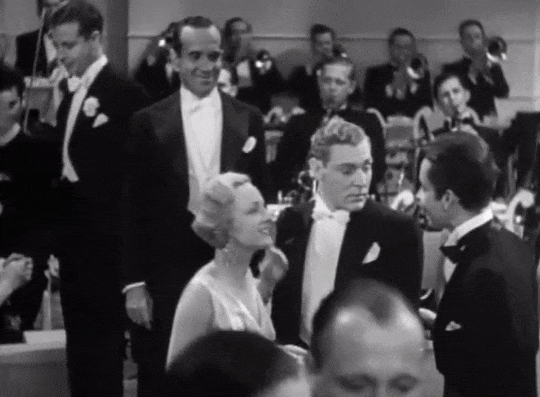
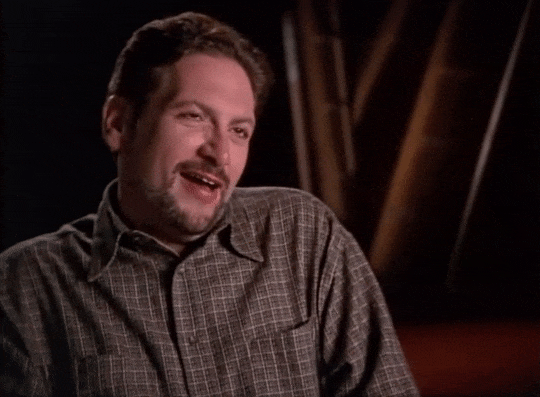
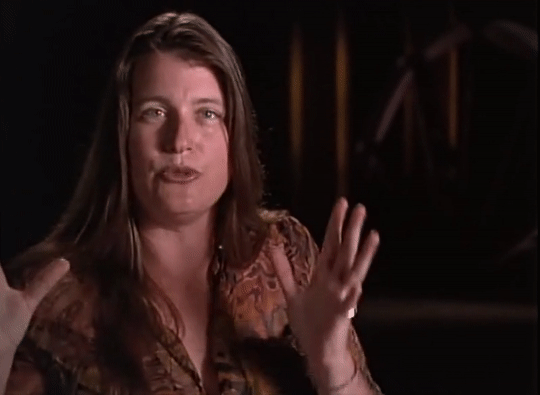

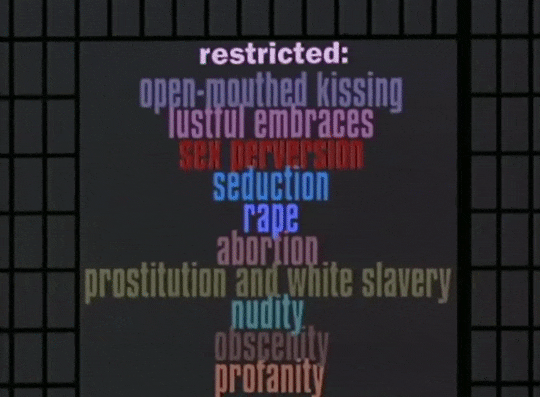

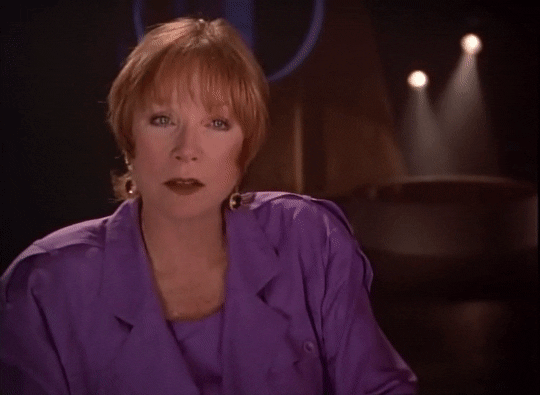


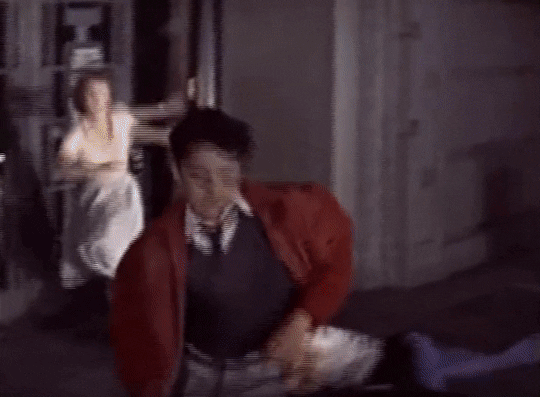
THE CELLULOID CLOSET (1995)
dir. Rob Epstein & Jeffrey Friedman
This documentary highlights the historical contexts that gays, lesbians, bisexuals and transgenders have occupied in cinema history, and shows the evolution of the entertainment industry's role in shaping perceptions of LGBT figures. The issues addressed include secrecy - which initially defined homosexuality - as well as the demonization of the community with the advent of AIDS, and finally the shift toward acceptance and positivity in the modern era.
(link in title)
#lgbt cinema#queer cinema#the celluloid closet#the celluloid closet 1995#us cinema#lgbt#usa#lgbt movie#queer movies#us movie#lgbt film#queer film#us film#lgbt media#queer media#north american cinema#Rob Epstein#Jeffrey Friedman#armistead maupin#harvey fierstein#1995#90s#1990s#90s movies#90s cinema#90s films#1990s movies#1990s films#1990s cinema
138 notes
·
View notes
Text
Hbomberguy did a pretty good job pointing out how Somerton has tried to take up the air of modern queer creators, stealing the works they made to little or no money or exposure, and using them to bolster his own fame. It's a truly reprehensible act.
But I feel like it's also important to briefly touch on what he stole from the past.
The Celluloid Closet is a backbone text on queerness and cinema. Like, if you're at all interested in the subject, please read the book, and watch the doc. Yes, the language will be outdated. It was written in 1981 and the doc published in 1995. Language evolves. I was fortunate enough to both read the book and see the documentary in the early 2000s, when I attended university.
It was written by Vito Russo, who held a Masters in film and a desire to fight for queer rights after witnessing the Stonewell riots. The Celluloid Closet was first a live lecture presentation, then a book. He would try to get the book made into a documentary in the early years, and after he died, others picked up that torch to carry on his work and to pay respect to the man.
Vito Russo was also one of the co-founders of GLAAD. He was a co-founder of ACT UP. You may have, if you've watched documentaries or seen news stories about the AIDS crisis, seen parts of his speech, Why We Fight. He protested, advocated, and educated even as people he knew and loved died, and he himself was dying.
As Hbomberguy notes in his doc, he would go on to pass in 1990. This was a man who fought his ass off, even while dying, for a better tomorrow and better representation.
The fact that Somerton stole his work is beyond insulting to the queer history, and queer film history, that he purports to give a shit about.
11K notes
·
View notes
Note
Can I get the lesbian/queer movie rec list again? I lost it when Tumblr decided to be a bunch of assholes and explode your account :(
awwww of course!!!!! it might be missing a couple because my memory isn't great, but here we go!
lesbian/sapphic films:
the handmaiden (2015)
the children's hour (1961) (tw for suicide and general angst)
yes or no (2010) (excellent thai film and my first real sapphic movie)
the girl king (2015)
bodies bodies bodies (2022)
all of the fear street movies
but i'm a cheerleader (1999) (you've probably already seen it but i would be remiss if i didn't include it)
titanic (1997)
the watermelon woman (1996)
portrait of a lady on fire (2019)
pariah (2011)
rafiki (2018)
disobedience (2017)
the color purple (1985) (i still haven't seen the new one, so stand by for an opinion on that)
bottoms (2023) (obviously)
the half of it (2020)
and that's all i specifically remember including in that list for now? if i remember more later, i'll be sure to add!
documentaries:
paris is burning (1990)
a secret love (2020)
howard (2018)
the celluloid closet (1995)
before stonewall (1984)
flee (2021) (an animated documentary)
i am not your negro (2016) (i got to see this one in theaters and it was beyond excellent)
i had to include some documentaries because i love them lmao
31 notes
·
View notes
Text
in the celluloid closet 1995, when richard dyer talks about the indirect expression of queerness found in films w/ queer subtext. the multiple layers behind this approach: the characters are keeping a secret, the film is keeping a secret, and the audience who knows this unspoken secret is keeping it too. everyone is in the closet together. it's a quote from the documentary i think about forever and ever, various reasons and through various angles. the repressed and silenced audience can connect, can relate, can identify themselves in a repressed and silent picture.
#me is mark#the celluloid closet#whether its a repressed sexuality#or its a repressed something else that the subtext embodies#there are ways to express things that can't be said#for the people who can't say it out loud but need it expressed
19 notes
·
View notes
Text
Stucky Recs: Pride Edition
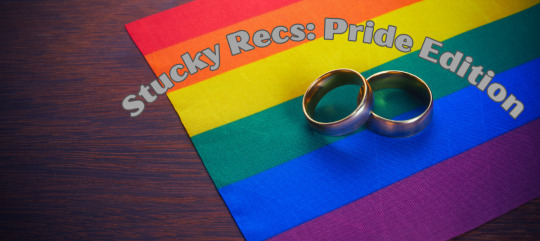
So, the original plan was to do dystopias and apocalypses as the next theme. I actually started that post. It's sitting in my drafts. But then between work, moving, and other real-life stuff, I sort of ran out of days in May. Now it's mid-June. And since it is mid-June -- and since part of the whole point of these rec lists is the theming -- I thought I'd go for Pride recs instead.
We'll do dystopias in July.
I could have done a lot of different rules/qualifiers with this theming, but, for this time/post I went with, "actively has sexuality themes as a decently large plot point." I ended up with 12 fics.
Note: As part of my personal campaign to combat the persistent idea that every great fic in this fandom was written in 2015, I'm now marking recs of fics written post-2016 and recs of fics written post-Endgame.
Canon
🏳️🌈 Tin Soldiers | idrilka | Teen | 19,743 words
You know what's great? Fake pop culture, fake academia, and fake social media. This fic makes such good use of all of those things and is so smart about it. I love that this fic narratively sandwiches CA:TWS. So a large part of the point here is the public perception of Steve, and of SteveandBucky right before, during, and then after the events of CA:TWS, in a world where all of that is real. The way it's done is brilliant and feels so true and accurate to life. There is live tweeting and live reactions. There are news headlines. There's fandom culture and blogging. There are social media arguments. It's just so well done. There are a lot of fics that look, at least briefly, at the public perception/use of Steve's legend in some way, and a lot of them are fantastic. I'm just so especially of fond of this fic. There's a hyper-realism to it. Plus, it includes a scene of people live reacting to Steve spontaneously and bluntly coming out on CNN. It's some beautiful stuff.
Quote:
As Michelle Mbatha argues in The Anatomy of a Sidekick, “Barnes’ transition from a partner to a sidekick marks the point at which the relationship between Barnes and Rogers becomes that of a mentor and pupil, thus effectively prohibiting any potentially »unsavoury« readings of their partnership” (121). In this sort of dynamic, one which emphasizes the much more prominent age difference, there is, indeed, no place for any assumptions of queerness or any sort of code similar to that which permeated cinematographic works of the time, signifying penalizable, “forbidden” practices falling under the censorship guidelines (see also: The Celluloid Closet, 1995). Bucky, then, in taking his place as Captain America’s teenage sidekick, becomes figuratively castrated in order to appear effectively sexless and thus avoid any possibility of coding their relationship as queer.
Moreover, the insistence upon heteronormative and ultimately exclusionary interpretations of Rogers’ relationships with Barnes and Carter respectively, both in the comics and in biographical writings, comes from the need to reaffirm the image created by the American propaganda, which constructed Captain America to reflect the intrinsically jingoistic policies of the United States, to propagate the myth of American machismo and uphold the wholesome image of the American everyman at the same time.
🏳️🌈Let me be buried under your name | tempestaurora | Teen | 50,669 words | **Post-Endgame Rec**
Oh no. This one. So, sometimes, my notes on fics in my rec database have sensible things like comments about tropes or moments I definitely want to point out. Other times, well -- The notes on this one say, "DOG TAGS," and also, "OH GOD." Which is very helpful of me. To myself. But I will say more coherent words about it to all of you. I imagine that fics that have both wartime and post-TWS scenes are emotionally trying for us all, and this very painful, and very beautiful fic is certainly a good example of why. There is a heartbreaking quality to the wartime Bucky POV, the during Hydra captivity POV, and the post-TWS Bucky POV that has really stayed with me. Bucky's thought processes, and his descriptions of Steve at various points, especially, are so observant and vulnerable all at once. It's also all just -- Guttingly but wonderfully romantic.
Quote:
Maybe he’d read before the light died entirely. Steve had bought him a pulp novel at the market and Bucky had been working through it slowly, dragging out the story and making it last, to make the most of the pages. He’d likely read it three times over before trading it for something else, and even then he’d tell the story to himself – mythical, magical things he’d never even thought of existing; time travel and other worlds, aliens and laser guns and space ships, exploring the stars.
His eyes fluttered shut, and he just listened to Steve’s breathing, to him drawing, to the birds outside the window. He’d more than once thought that he could live in this moment forever; that he’d be more than happy to live out the rest of his days just like this one, with Steve and a crummy apartment and a warm summer day. Screw marriage, kids, and a house in the suburbs – this was where Bucky pictured when he thought of home.
This was what he’d be imagining on the cold nights in Europe. This was what he’d fight to come home to.
🏳️🌈We wear red so they don't see us bleed | unicornpoe | Teen | 2,161 words | **Post-Endgame Rec**
This is the most beautifully tense little fic. A canon-divergent-before-canon-starts fic (I never know how to classify those. If it's AU, but Steve and Bucky still move in together by like, 1939-ish... is it fully AU? Like, yes because them as childhood friends is important, obviously, but also -- in the grand scheme of overall canon -- sort of no?) that has Steve and Bucky sitting in jail cell doing this dance of little cues about each other. This is all little words and gazes and touches; there is a conversation under a conversation in this fic. They're having this casual chat as strangers in jail, except they're also having this whole second secret dialogue underneath it where they're trying to make sure they speak each other's language. Also? I adore this characterization. I love it.
Quote:
Bucky stands up and crosses the cell in two long strides, draping himself in clean lines along the section of free bench next to Steve; he pulls one leg up beneath him and stretches the other out, so that their ankles almost touch.
Turned toward Steve as Bucky is, he can watch fully the sharp, barely-there movement of Steve’s eyes flickering down to their legs, and then back up to the wall across from them. He doesn’t turn to Bucky.
It’s mostly silent in here. There’s a faint murmur of voices somewhere down the hallway, the quiet, steady tick of a clock hidden from view, the various noises of the men locked up with them—but other than that, nothing.
“Where’d a guy like you learn to throw a punch like that?” Bucky asks finally, when he’s spent too long staring at the delicate, fucked-up line of this man’s profile, spent too long raking his eyes over and over again down the line of his feather-soft lashes.
The corner of Steve’s mouth ticks up, just slightly, just a little bit.
Shrunkyclunks
💗I just met you (and this is crazy) | littlesystems | Explicit | 41,784 words | *Post-2016 Rec*
This is one of those fics that surprised me with just how much I liked it. I certainly wasn't expecting to dislike it, but I was not expecting to love it so much, either. It's a joy, though, just a total feel-good joy. It's a fic that has Steve and Bucky pretty instantly head-over-heals for each other, something I never ever object to, and the instant attraction works so well here. I think, too, so much of what I love about this one, is that they make each other so happy in it -- like the two of them truly just get dumber and happier and more in love with every 100 or so words of this fic. So then I get happier and happier as I continue to read it. Seriously, this fic is a joy in part because Steve's POV is so damn giddy and joyful about Bucky. I love that. It's good stuff.
Quote:
“You’re a person, Steve. And if people hurt you or take advantage of you, that’s not your fault, either. You should be able to go to a bar. You should be able to hook up with some guy. There’s nothing wrong with any of that. The fact that someone took pictures is the photographer’s fault. And the fact that newspapers decided to print it is the editors’ fault. And the fact that some fuckwad decided to lie for a quick buck is his fault. You may regret it, and that’s fine. But I don’t want to hear you blame yourself again. Got that?”
Steve nods. His throat feels tight enough that he’s not sure he can speak. Bucky tips their foreheads together and they sit in silence, until Steve has naturally matched his breathing to Bucky’s - slow, deliberate, relaxed, and not geared up for a fight.
Bucky kisses him softly, then.
💗The Voyager | notlucy | Explicit | 76,740 words | *Post-2016 Rec*
I am a sucker for the Steve and Bucky road trip fic. A very recently arrived in 21st century Steve on a road trip with a modern Bucky? All that time alone? In those motels? That might or might not have the right number of beds? This is a good trope that we should very much use forever. This fic is such a classic sort of road trip fic. Honestly, I've never been on any sort of proper, real road trip, but I'd like to think this fic feels like a road trip -- what they must feel like, anyway. There's such freedom in the storytelling here. There's a suspended sense of time in this fic. There's a way this fic rolls along with a pace that makes sense here, in this story -- it's a pace that definitely wouldn't work in all stories, which is exactly why it does, in this one. It's lovely, it's a little bit surreal, and it stays with you long after you finish it.
Quote:
“Wow,” Bucky managed. Words were difficult when faced with something so spectacular, the canyon spread out before them lit with the slow, smoldering burn of that deep, ancient glow.
“Awesome,” Steve murmured, the word incongruous in his mouth. Bucky nearly poked fun, until he realized Steve meant it literally - what they were seeing was awesome.
Smiling, he leaned his head against Steve’s shoulder before entwining their fingers, not caring a whit who might see them. Who might care. At that moment, Bucky wanted to tell the entire world, because he was in love.
Except it wasn’t love. Strong like, maybe. Effortlessly increasing affection, sure. But not love. You couldn’t fall in love that fast. He’d only known Steve since May, after all. It was at most infatuation. Appreciation. Fascination.
Bucky was a very level-headed person. It wasn’t love.
But it was something.
Modern
🌈On The Back of a Raindrop | musette22 @musette22 | Explicit | 52,215 words | **Post-Endgame Rec**
Something I love to read in kid fics is any time that thing happens where it's not just Steve and Bucky acting like a couple without being together yet, but a group of people starting to act like a family unit in every single way -- except that no one has talked about that, or acknowledged it, and technically, someone is actually still the neighbor, or the babysitter, or, in this case, the gardener. I love that, and I love this fic, specifically. Featuring this sweetest and loveliest and healthiest family forming in a backyard garden over the months of a beautiful summer. It's so domestic, so intimate, and it happens so naturally over the course of this story. It makes everything feel so perfectly meant to be, so romantic, and so satisfying. Also! One of my database notes on this one is, "SARAH," because this is a fic with a very alive Sarah Rogers, and I love, love, love, Steve and Sarah's relationship in this fic.
Quote:
Now that he’s gotten to know him, seen him with the twins, has gradually watched Bucky’s tan deepening and bringing out the grey-blue of his eyes, Steve is so wildly attracted to him sometimes that it knocks the breath right out of him.
It’s how he ends up sketching Bucky again on Wednesday, from his usual spot in the shade. He makes sure to make it a PG rendition this time, including Gracie and Miles as well, so that when later, Bucky asks him ‘Hey, whatcha drawin’?’, Steve can actually show him the sketch.
Bucky is silent for the longest time when Steve hands over his sketchbook. For a moment, Steve almost panics, wondering if he accidentally forgot to draw Bucky’s jeans or something, but then Bucky looks up, a look in his eyes that Steve can’t quite pinpoint.
“This is amazing, Steve. Could I… Would you mind if I hold on to it, maybe?”
Steve blinks in surprise. “Of course, yeah. I mean, it’s not my best work. I could do you something better if you like.”
“It’s perfect,” Bucky frowns, seeming almost offended Steve would suggest otherwise. “I love it.”
🌈One for Fiction | thepinupchemist | Explicit | 6,713 words |*Post-2016 Rec*
I very much enjoy a shrinkyclinky-ish modern fic where Bucky is a disaster about the fact that Steve, like, exists. I am just so here for this, and this very adorable fic is a top-tier demonstration of that. Featuring a Veteran-turned-librarian Bucky and a barista Steve, and a lot of awkward flirting. At a library! Also featuring a lot of Bucky being a disaster about Steve, but also a lot of Steve being like, "...have you? seen? or? met? yourself? You are definitely the catch here." It's cute. They're cute. This fic is cute.
Quote:
“Fun fact about the library,” Bucky went on, “As long as no one can see your computer screen, you’re allowed to look at porn. That’s protected under intellectual freedom.”
Steve raised a brow. “Interesting.”
They meandered back to Bucky’s display. The night, as far as nights went, was a quiet one for the library, and the cafe was a ghost town, but for the group of teenagers with bags of McDonald’s scattered across the table and AP History books open on their laps.
“Where’d everyone get their pronoun pins?” asked Steve, as Bucky pushed his stepladder upright, collected his tape dispenser, and climbed back up to finish hanging the flag garland.
“They make ‘em at one of our sister libraries,” Bucky said, “Have a pin press over there and everything. I’m picking up a couple of shifts for one of the ladies over there next week; you want me to grab you some?”
See, Bucky used to be this smooth. He used to be this smooth all the time. Apparently, trauma and PTSD aside, he could still be smooth every once in a while.
A pleased little smile tilted beautiful Steve’s beautiful lips. He said, “That would be awesome. Do they have pride ones, too? Like your rainbow?”
Does Steve like men? Steve might like men. Be cool, Barnes. Don’t be weird.
🌈Wholesale Change | biblionerd07 | Mature | 83,320 words | *Post-2016 Rec*
You know how sometimes you're the captain of an NHL team, and you're very talented, but over the years you've gained a bad reputation? And so your people all but force you to do a The Bachelor-esq dating show? And you've been having a terrible few years and feel like your life is falling apart? And also you're bisexual and closeted because of the whole NHL thing? And also the camera guy on that dating show is your long-lost very attractive best friend? Who also used to play hockey? Look, this fic has a ridiculous premise. In the best possible way. It's a delightfully ridiculous premise. It's so much fun. There's literally a dating show. Steve gets mad about dating show manipulations and lies! And, you know, Steve definitely ends up selecting one of the dating show contestants. Steve definitely does not fall for Bucky instead! Steve definitely does not purposefully out himself on live TV. Steve absolutely follows the rules and sees the dating show contract through! Because as we all know, Steve Rogers follows rules and does what people with authority tell him to do. Always and at all times. So much fun. So delightful.
Quote:
“I’m so tired of lying,” Steve says. He almost sags with the weight of it all, now that’s admitted it. He was trying so hard to outrun it all. Outskate it all, maybe. But he’s been losing for a long time now.
“I know,” Bucky murmurs. “I’m sorry. But I don’t think letting him tell the world is going to make you feel any better. You need to tell the truth on your own terms.”
Steve sighs and leans his shoulder against Bucky’s. “I’ll talk to whoever I pick,” he says. They deserve that, at least. He doesn’t want to pick someone under false pretenses.
Falser, anyway.
“You won’t get much alone time,” Bucky warns. “But I’m sure you can find a way.”
“Nothing gets in Captain America’s way when his mind’s made up,” Steve says in his cheesy commercial voice. It was a line from some ad campaign he did for a sports drink he didn’t even like. Bucky snorts.
“I was thinking more about Steve Rogers,” Bucky says. “That asshole’s unstoppable.”
And after a line like that? All Steve can do is kiss him.
🌈Songbird | chicklette | Explicit | 70,843 words | **Post-Endgame Rec**
I am very fond of this fic. It's music industry closeting -- but then planned sexuality revealing. Through lies. This is a fic that starts off with what should have been a one-night stand -- a great one, as one-night stands go, but a one-night stand. Except, pictures are taken of them very early the next morning, hugging, in front of Steve's apartment. And Bucky is very famous and very not out. Bucky's already got a damaged reputation and a host of other problems, and so his team decides that, actually, Bucky pretending to date some non-famous, pretty-faced, nice boy for a couple months might do his reputation some good. So, then, as you can imagine, being Steve and Bucky, the two of them spend the fic doing a very excellent, really great, just super good job, at sticking to having a formal arrangement. A no sex, no feelings, totally-just-a-business-deal-smile-for-the-camera-thing. They're total pros at it, okay? It goes so well for them. They definitely succeed. Just because, whatever, they quickly become friends and get close, it's totally still fine. They're definitely still doing really amazing at this, alright? They've got it under control. They're not going to crack on any of this. No sex. No not-for-the-cameras-kissing. No feelings. No one will cry at any point. Nope. They're So Good at this. Like I said, I'm super fond of this one.
Quote:
Steve smiles, his face going all soft and sweet, and it’s like a knife to Bucky’s heart. Ten more weeks, and someone else gets all those smiles. It’s a Goddamned shame, is what it is.
His thoughts are uncomfortable enough that Bucky gets up and goes to the railing, looking back out over Manhattan. All the people there, living their lives, day in and day out. How many broken hearts is he looking at right now? How many people starry-eyed with new love? How many people, he wonders, comfortable in an old love, one that’s solid and still growing, deeply rooted, secure enough to be safe, but fresh enough to still bloom?
“Penny for your thoughts,” Steve says, and Bucky tilts his head to look at him.
“There’s a million love songs happening right now, just waiting for someone to write them.”
“That’s awful hopeful, coming from you.”
Bucky chuckles. “Nah, I was just wondering how many people we’re looking at right now with broken hearts.”
🌈Strong Saftey | queenmab_scherzo | Mature | 23,043 words
As a first note here, I will point out that this fic is a sequel to Targeting, and it is probably most satisfying when read with full context. But I really do think it can absolutely be read on its own. I really, really appreciate and love the way this fic handles Bucky and trauma. (the Targeting 'verse mirrors canon very closely, re: bad things happening to Bucky. Except that it's about college football.) Bucky's headspace here, and the way that then translates to his actual dialogue/actions is so, so well done. Plus, Steve and Bucky are preestablished in this fic, and it's healthy and lovely and romantic and makes me emotional-- Bucky is so hard on himself about everything, all the time, but he's got Steve, who is wonderfully loving and supportive. Also! Bucky befriends a cat. Also! Bucky legitimately has Steve saved in his phone like this: "Punk ❤️."
Quote:
"Vanilla latte, no whip?" the barista calls. Steve goes to the counter for his drink, but keeps his ears open.
"I just wanted to tell you—I came out to my high school team last week. And, um. It's gone really well actually."
"Wow," Bucky croaks.
"Yeah, it just, I've been scared about it for a long time, but then you told the whole NFL, so I thought—yeah. I just wanted to say … thanks."
From the corner of his eye, Steve can see them shake hands.
"Wow," Bucky says again. He clears his throat a little. "Thank you. I mean, thanks for telling me."
"I'm headed out to visit Oregon now, actually."
"Football?"
"Yeah."
"Holy shit," Bucky says, candid as ever. "That's legit, man. Good luck."
"Thank you." The kid starts to turn away, then adds: "For everything."
When Steve goes back to Bucky's side, Bucky is staring into the paper bag at his donut. He sniffs, audibly.
"Are you crying?" Steve asks quietly.
"No."
Steve can't see his eyes through the sunglasses, but his nose is really red. It makes Steve smile. He doesn't press the issue.
🌈Rough Edges | sparkagrace @sparkagrace | Mature | 33,278 words | **Post-Endgame Rec**
Showmances and Rivals-to-Lovers on the Stars on Ice Tour! There's a lot to be excited about here. This fic is such a delight, truly. I love it. You know that post that goes, "What is a rival other than a crush you're mad about having?" Steve spends the first chunk of this fic so disproportionately angry at Bucky for incredibly minor things. Like standing in rooms or... skating. It's amazing. But then there is bonding and heart-to-hearts. Often on skating benches! And, as it turns out, those two being around each other a lot is, as always, a very, very good thing, in the long run. One that helps them both. Also! Becca texts Bucky lots of pictures of Alpine -- pictures from Alpine. Also! Bucky and Nat have a somewhat frighteningly intense friendship/skating partnership and it's all just so, so great.
Quote:
Bucky continues on the corner edges while Steve sorts through one of the color groups. He thinks he has enough to make up branches of the tree that was displayed on the front of the box.
He likes it when he finds the pieces that fit together, it’s like his brain fires little electrons of glee when they slot into place perfectly. He tries not to think about the fact it’s the same feeling he gets sometimes when he and Bucky execute their twizzles in perfect synchronicity. The same way he likes the sound of their prop swords clashing when they’re choreographing their throne number. Everything seems to feel matched when he’s around Bucky lately, like they’re synced partners as much as he is with Maria or Bucky is with Natasha.
Puzzle pieces.
Bucky seems to be enjoying it too. The quiet as they work together to put together this puzzle that neither of them would have looked twice at if they weren’t desperate for a distraction. A distraction from his heartache, from Bucky’s boredom… from the way that Bucky keeps looking over at him, from how he wishes they were doing this under different circumstances.
🌈Right where we are | steveandbucky | Teen | 10,395 words
This is actually the first fic in a whole 'verse, and they're all super sweet and super lovely. I really enjoy the way this Steve and Bucky build their relationship. I love seeing them get to have happier lives where they just get to be good for each other and good to each other, and this 'verse's Steve and Bucky, who do their best to communicate and who are so so cutely smitten from the gate, are great for that.
Quote:
“Hi,” Bucky smiles again, wider this time and the effect it has on Steve is embarrassing, since he can barely get out a greeting in response.
Bucky looks ten times better in person. His now longer hair parted in the middle, and he has a two-day-old stubble, looking gorgeous in a navy blue shirt and dark form-fitting jeans.
“Fancy running into you here,” he says as he leans closer to be heard above the music.
Steve gets a waft of cologne, a sharp and somewhat sweet scent that draws him in as he briefly leans in to speak close to Bucky’s ear. “I’m just here with some friends, I swear I’m not stalking you.”
Bucky laughs heartily, ducking his head and crinkling his nose as he does. It’s the cutest thing Steve’s ever seen, and fuck if he wouldn’t spend every minute of every day trying to get Bucky to laugh like that again.
“Didn’t think you were stalking me. But what a coincidence, huh?” Bucky says, still grinning. “Nice to finally meet you, Steve Rogers.”
Bonus:
So, this is WIP, and I haven't started reading it yet. But! From everything I know about it, it absolutely fits what I'm going for on this rec list. Also, I've loved every other fic by @zenaidamacrouras1 that I've read. So while I can't actually rec something without reading it, I did feel like this should be in this post somewhere:
Unpredictable Synchronicity | Zenaidamacrouras1 | Mature | 106,788 words (WIP)
Second bonus:
These are fics that 100 percent should/would be on this list, except that I literally just rec'd them in my Brooklyn stories post. They are wonderful for all reasons described in the Brooklyn post:
Three White Horses | magdaliny | Mature | 16,601 words
Not In The Answer But The Question | aimmyarrowshigh @aimmyarrowshigh | Teen | 27,382 Words
Ill With Want | thedoubteriswise | Mature | 26,999 words
This turned into a very long post, but that feels fitting. Happy Pride! 🌈
Like I said, next up will be dystopias, apocalypses, etc.
More Recs
#SteveBucky#Stucky fic#Stucky Fic rec#Fic recs#Fic Rec Series#me rambling about other people's writing
140 notes
·
View notes
Text
"In queer film criticism, mainstream cinema has long stood as the culprit in distasteful and harmful depictions of LGBT people. To many critical and scholarly accounts, its history is laden with ruthless Hollywood directors and executives sensationalizing or censoring sexuality and gender variance. Accordingly, Hollywood and other mainstream industries made films littered with the vilified stereotypes of the helpless pansy, the prurient lesbian vampire, the self- loathing and confused closet case, the insatiable bisexual, and the depraved transsexual. And as one might assume, their narrative
outcomes were almost always bleak. That is, of course, if the film could even get away with explicitly representing queerness instead of just alluding to or encoding it, as was the case during the Hays Code years. For critics and scholars, these texts reflected an oppressive culture determined to malign queers. The result of these depictions, it has been argued, is to help construct or reinforce harmful ideas and, for queer spectators, to produce feelings of self- disgust and inadequacy. It is in this way that trauma and harm— both self- inflicted and motivating hate in others— get centralized in queer film scholarship that charts non-avant-garde histories pre–New Queer Cinema.
(...)
In its affective politics, much scholarly queer film historiography begins to look, as Sedgwick would put it, quite “paranoid.” After all, the narrators of this history meet Sedgwick’s criteria for paranoid readings: to anticipate an object’s harm; to have faith in the ideological exposure, demystification, and decryption of its harm; and to generate others’ analogous participation by way of making paranoia teachable and mimetic. I want to stress that Russo is not the only paranoid reader in this historiography, notwithstanding
his resounding influence. Reading queer cinema scholarship through the years reveals that pleasure is too often taken as suspect. The default starting point is frequently homophobia, heteronormativity, and heterosexism, the scholar then positing how these problematically structure viewer desire and identification. Further, from gender studies to film studies courses, the 1995 documentary The Celluloid Closet (Rob Epstein and Jeffrey Friedman) continues to be a mainstay of queer film pedagogy. The film version, like the book, enjoins its readers to adopt a certain kind of interrogative practice that takes representation at face value. This becomes a teachable narrative with a cogent argument and streamlined thesis about queer film history. Epstein and Friedman’s documentary, Heather Love suggests, echoes Russo’s aim to chart what she provisionally calls the “trauma of queer spectatorship.” Love, however, shrewdly observes that something felicitous happens in translation from book to screen. Although it follows the overall structure of the book, the documentary version of The Celluloid Closet (1995) supplements Russo’s narration with a polyphony of voices— ranging from scholarly expertise to personal anecdote— from critics, actors, and directors who all have close relationships to the queer films cited. Love writes, “[T] he use of interviews creates the atmosphere of a group screening, in which knowing subjects speak over and against the images we see on the screen and also drain them of their pathologizing force.” Love here pinpoints how the documentary functions as a (conscious or not) reparative modifier to Russo’s severe approach, lending other viewpoints and positions to a queer spectatorial past. Such voices, I would agree, mitigate the perceived trauma of queer spectatorship by giving necessary voice to negative affects and by restoring the place of pleasure, awkward and shameful as it may be at times. Take, for example, Harvey Fierstein’s bashfully revealing his love for and identification with the stereotype of the sissy; or recall Susie Bright relishing Mrs. Danvers’s fur fetishism in Rebecca (Alfred Hitchcock, 1940). By including clips from and romantic montages of different queer films, or even films with sparse queer moments, the documentary tacitly sidesteps Russo’s line of argumentation, thereby enacting a form of reparative historicizing that subordinates— in moments— trauma to pleasure. It brings to bear the alternate histories, where structures of multiple feelings are brought to the fore."
Marc Francis, For Shame!: On the History of Programming Queer Bad Objects
20 notes
·
View notes
Text
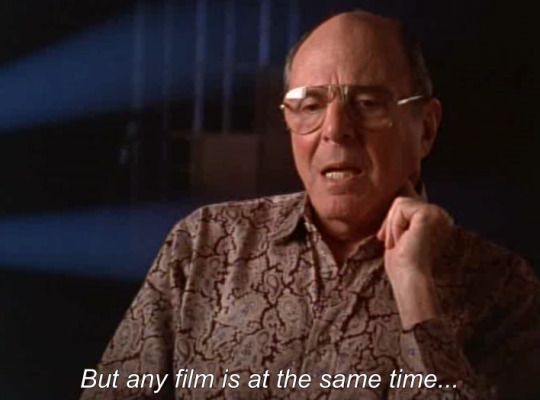
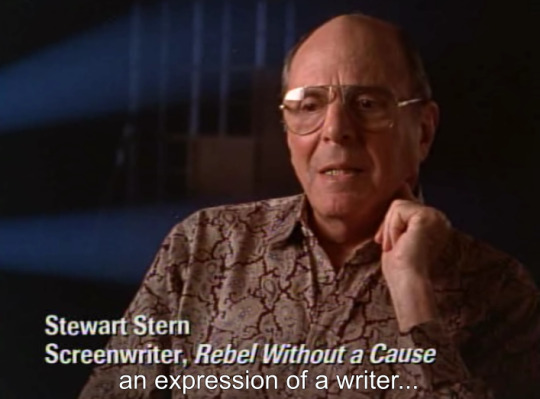
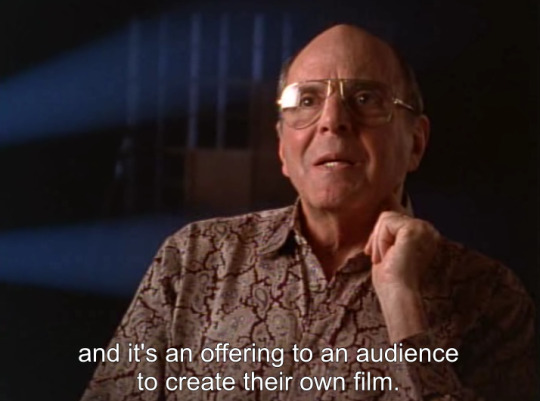
the celluloid closet (1995) dir. rob epstein, jeffrey friedman
40 notes
·
View notes
Text
Audrey Hepburn Summer!
Tonight’s watch: The Children’s Hour (1961) (Photos and trivia from IMDB)
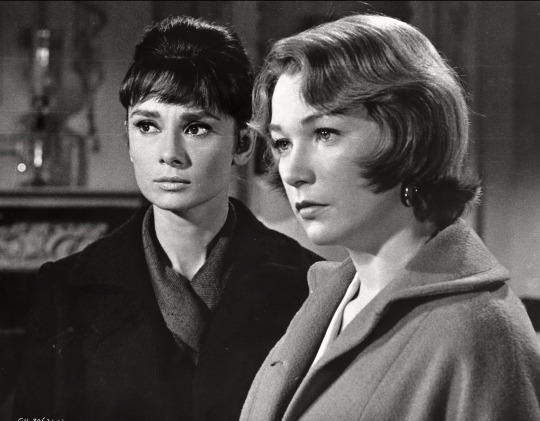
This film adaptation of Lillian Hellman's play was an intense watch, as you see the way a lie from a vindictive, cruel child destroys the life of two people (more if you include all of the supporting characters). The tragedy is how much the accusation of being lesbian hits home for one of the women. While I knew that it would end tragically (the trailer sort of gives it away), I was still devastated.
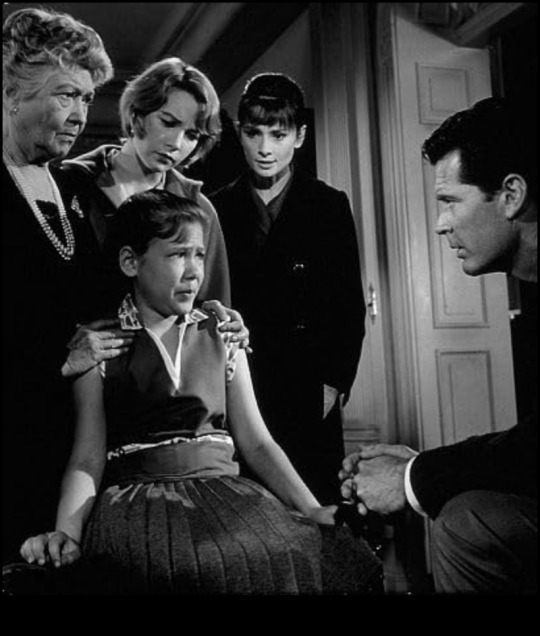
The acting is incredible - everyone knocks it out of the park. Even the children: Karen Balkin was terrifying as Mary, the child who perfected the art of bullying and terrorizing other girls before turning to target her teachers.
On set, the children enjoyed hanging around Shirley MacLaine, thinking her “cool” and “generous”, according to Veronica Cartwright, who played Rosalie. Cartwright won the role after keeping calm during the audition when director William Wyler fired a gun. (She remembers thinking how it wasn’t a wartime film.)
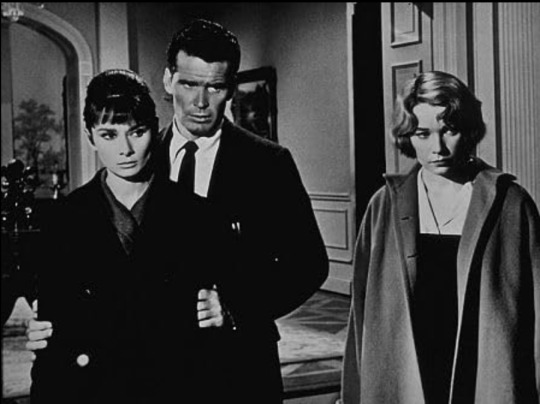
While talking about this film for the documentary, The Celluloid Closet (1995), MacLaine said, “none of us were really aware. We might have been forerunners, but we weren't really, because we didn't do the picture right. We were in the mindset of not understanding what we were basically doing. These days, there would be a tremendous outcry, as well there should be. Why would Martha break down and say, 'Oh my god, what's wrong with me, I'm so polluted, I've ruined you.' She would fight! She would fight for her budding preference. And when you look at it, to have Martha play that scene - and no one questioned it - what that meant, or what the alternatives could have been underneath the dialog, it's mind boggling. The profundity of this subject was not in the lexicon of our rehearsal period. Audrey and I never talked about this. Isn't that amazing. Truly amazing."
At least this movie was able to keep the lesbian plot; the last film adaptation of this play, retitled These Three (1936), changed the lie to be about a heterosexual love affair. Even so, Wyler had to cut scenes that hinted more strongly at a character’s sexuality to get the movie past the censors.
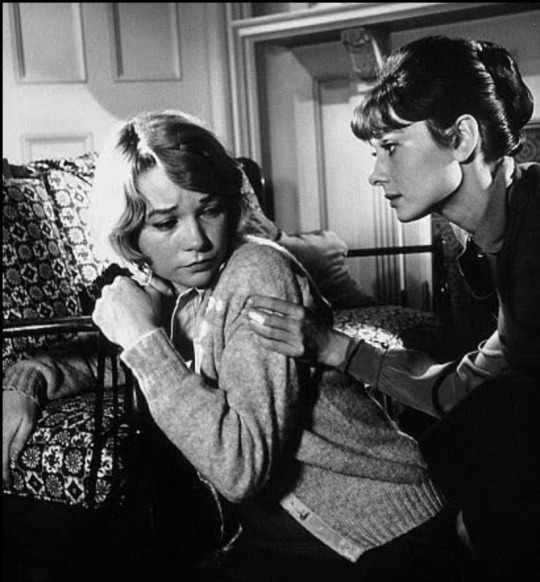
I was able to get a DVD of this movie from the library, but you can also find it on Pluto TV, Roku, Tubi, and Amazon.
#audrey hepburn summer#audrey hepburn#shirley maclaine#james garner#karen balkin#veronica cartwright#lillian hellman#william wyler#the children's hour#the children's hour (1961)
12 notes
·
View notes
Note
Hi! I found the song from the riverdale finale when they’re all on the bridge! It’s on spotify on the riverdale season 7 soundtrack playlist and it’s a cover of the Moby song God Moving over the Face of the Waters by Vitamin String Quartet :)
OMG THANK YOU! and google says that just as expected, using it is likely a reference...to the closing scene of the crime movie heat (1995).
which I haven't watched yet but I do regularly see on lists of ~celluloid closet action classics~ alongside fight club, point break, top gun so I'm betting it's relevant and will be very fun to unpack.
#riverdale#any heat and riverdale understanders want to connect some dots?#bonus if you can web weave with the supernatural finale bridge included
11 notes
·
View notes
Text
'WE LIVE IN A GOLDEN AGE of cinematic embraces between queer children and their parents. The PFLAG-waving parade arguably began with 2017’s Call Me by Your Name, whose young protagonist, Elio, finds that his father not only knows he is gay but professes to envy the intensity of his romance with a much older man. A year later, we got Love, Simon, whose titular character comes out to his parents while opening presents on Christmas morning and finds himself the recipient of a teary monologue from his therapist mother promising unconditional acceptance. The adult protagonist of 2020’s Happiest Season, Abby, learns that her father is ready to sacrifice the support of a major donor so that he can publicly champion her queerness while on the mayoral campaign trail. Finally, 2023 gave us the cake-batter-coated fantasy of Red, White, and Royal Blue, in which the first female president of the United States takes time out of her day to lecture her newly-out son about bottoming and Truvada. Parents in these recent movies do not slowly come around to their child’s coming out; they trumpet their full-throated support. Their kids are here, they’re queer, and goddammit, the parents get it.
These movies represent a sharp departure for American cinema. A tour through The Celluloid Closet (1995), the landmark documentary of queer cinematic imagery based on Vito Russo’s 1981 study, makes it painfully clear that for most of its history, Hollywood has largely depicted queer existence as a litany of suffering, while positioning parents, if they appear at all, as a central wounding force in the queer psyche. Historically, parents of queer children in the movies disown their kids, whether literally or figuratively (in a surprising number of these films, parents are simply absent). To watch gay movies from the 1950s up through, say, 2016 is to learn to cringe when a parent walks into the frame, anticipating they will force their cowering children onto the streets. The pivot toward portrayals of parental affirmation has, then, been sharp and undeniable.
Unsurprisingly, media coverage of these movies has tended to paint the rise of what one might call the “embrace and understanding” narrative as a positive, perhaps even revolutionary, development. Seeing parents throw their arms around their queer children on the big screen, some critics have suggested, works as a kind of instructional video: parents can learn, through watching, how to hug and affirm instead of sending their child packing. Directors and writers of these films, meanwhile, sometimes suggest that watching queer kids getting loved so hard by parents who know too many of the words, who get it too much, is itself subversive—because this is the first time that parents have been shown as being entertainingly expert at being allies.
Given the grim history of Hollywood’s treatment of queer characters, these arguments have a surface plausibility. But while these movies may be comforting, do they actually satisfy anyone? I don’t hate feeling good. But I find these films’ entreaties for acceptance stifling, prescriptive in the moralism lingering just underneath their tear-stained embraces. I experience a kind of exhaustion viewing their rah-rah energy beneath the thick billows of theoretical confusion. They leave the same tired aftertaste I get picking Bank of America confetti off of my clothes in Pride Month. What, I find myself wondering, does it even mean to “accept”? What should acceptance, between a parent and child, entail? And why is the opposite of being thrown out of the house being “understood”?
All of Us Strangers, the new film from Andrew Haigh, the director of Weekend (2011), a landmark of queer cinema, grapples with these questions as it tells the story of the relationship between a gay child and his parents. And I was relieved to find that, unlike its recent predecessors, the film does not equate love with acceptance or acceptance with understanding.
All of Us Strangers tells the story of a screenwriter, Adam (Andrew Scott), who returns to his childhood home in the suburbs of London just as he begins to write a screenplay about his parents, who died in a car crash when he was twelve. Upon his arrival, he discovers that his parents miraculously live on in the home. Though he has aged, they have not, so that he appears older now than they are. Adam’s parents are desperate, in a basic way, to know him. They press him on his life in their absence and are thrilled to learn that he is a writer, that he has moved to London. When Adam arrives wet from the rain one day and takes off his sopping clothes, his mother reaches out to his body, taking in the fact of his maturation and the surprise of the person he has grown into in their absence.
And yet, as its title suggests, All of Us Strangers is centered not around understanding, but around inexplicability—the limits of knowing and the possibility or even necessity of remaining in large part a stranger to someone you love. (As if to reinforce this in formal terms, the film itself plays with genre, blurring the boundary between ghost story and fantasy.) Adam discusses his queerness most bluntly in two exchanges, one with each parent. Each scene is effectively a coming out, refracted through the lens of mutual surprise and disappointment. In one, Adam’s father recalls hearing Adam cry in his room each day after school. When Adam asks why his father never came in to comfort him, his father admits not wanting to confront the possibility that his son was the kind of child whom other children would bully. Even more painfully, he did not want to confront the fact that as a child he, too, would have been one of those bullies.
In the other scene, Adam’s mother asks whether he has found a girlfriend, and in response he tells her that he is gay. Matter-of-factly, she says that no parent would want to think such a thing about their child. She is incredulous to learn that gay people can marry and is then fearful about the implications of his gayness, worried that it might bring loneliness or the risk of contracting HIV/AIDS. When he tells her that things have changed, she says, simply and truthfully, “I wouldn’t know about that.”
In Haigh’s tender and generous lens, Adam’s parents’ lack of understanding of this fundamental part of his identity does not preclude them from loving him, or him, in turn, from loving them. The essential poignancy of the movie derives from the idea that Adam cannot stop coming back to them, and to the simultaneous safety and hurt of that home. For much of the film, he seems to be fleeing the modern world—the London where, he reassures his mother, he can walk safely down the streets as an openly gay man—in order to return over and over to the house where his parents remain, trapped in the eternal amber of the eighties. He comes back to reassure them and to seek reassurance for himself. They trade memories of their disappointments in each other, their annoyances and mutual failures.
Importantly, queerness is only one axis of what they do not know, and what they hide, from each other. Often, when Adam returns home, one parent is there and one is missing. But they do not tell him where they go, nor do they ever discuss the metaphysical loophole by which they have stayed alive. The essential unknowability of others, including or perhaps especially the unknowability of those we love, is the steel that runs through the movie: in their final moments together, Adam hides from his parents the circumstances of their own death, sparing them as well himself.
I felt, watching All of Us Strangers, that I had seen—for perhaps the first time in my life—a film brave enough to assert that the alternative to parental rejection does not have to be saccharine, absolute affirmation. It satisfied a longing I had felt for years: to see a movie that depicted a textured relationship between queer children and their parents, such as the nuanced ones portrayed in Andrew Solomon’s 2013 book Far from the Tree. Solomon, who is gay, centers Far from the Tree on families characterized by children with what he dubs “horizontal identities,” a term describing traits that lead them to diverge markedly from the experiences and identities of their parents, rather than the more traditional “vertical identities” that they might inherit through genetics or upbringing. (The book began, by Solomon’s account, when he was assigned to report on deaf culture and was struck by the parallels between the deaf experience and his own queerness, especially when deaf children spoke of their relationship to their hearing parents.) Far from the Tree profiles parents whose children differ from them in many ways, including children who have dwarfism, who are autistic, who are trans, and even those who are prodigies.
These horizontal identities lead inevitably to rifts in what parent and child can know about each other. And though Solomon specifically selected parents, as he tells us, who came to accept their child’s identity, Far from the Tree, like All of Us Strangers, offers a different, more complicated account of acceptance from the one we get in Love, Simon and Happiest Season. Acceptance, for Solomon, is not about knowing but about “misapprehending.”
In one of many moving reported scenes, Solomon visits an annual meeting of Little People of America, a conference for people with dwarfism, and goes over to comfort an adolescent girl whom he discovers half-sobbing, and half-laughing, at the shock of finding herself surrounded by thousands of other people who look like her, as her mother stands off to the side, watching. Some version of this scene repeats itself throughout the book; over and over, parents acknowledge the discomfiting reality that there are vast communities of people on the Earth, strangers to them in all other regards, who might nonetheless understand some central part of their children more than they themselves ever will.
The acknowledgment, or concession, that children and parents need not—perhaps cannot—understand each other on some of the most fundamental axes of their separate lives also forms the emotional core of All of Us Strangers. And while Haigh’s insistence on the limits of what a parent can know might seem bleak when measured against the sheer happiness of a movie like Happiest Season, let alone the campy joy of a movie like Red, White, and Royal Blue, the message of All of Us Strangers is, if not joyous, then deeply humanist: in emphasizing the boundaries of acceptance, even comprehension, it sets parent and child on surprisingly equal ground. Adam returns repeatedly to his parents to explain who he is, and they attempt, in turn, to explain themselves to him—the fears they held as young parents, the worries of their own inadequacy, the hope they might have grown to be better, if they had had more time. In this, the movie echoed, for me, the conversations in Far from the Tree that I remember and return to most. Repeatedly, throughout the book, children discuss how much of their parents’ experiences is unfathomable to them just as frequently as their parents mention the strange joy and heartbreak that comes with realizing that their children’s identities have given them lives profoundly different from their own.
Ultimately, in these works, it is not a child’s queer identity that prevents them from being understood by a straight parent; rather, being misapprehended comes to seem like the base state of any relationship between humans. And “acceptance” means accepting that between a parent and a child, and perhaps between any two people, lie vast territories of human experience, maybe large enough to cover the whole span of a life, that each can never know about the other. To love one another is to wish that with more time, you would come to a mutual understanding—and then to admit that you may not. In its portrait of the reality of this hard task, All of Us Strangers is strangely empowering. The attempt to understand those we love, Haigh suggests, could take up a lifetime, ten lifetimes, an eternity—if only we could let it.'
#Call Me By Your Name#All of Us Strangers#Andrew Scott#Paul Mescal#Love Simon#Happiest Season#Red White and Royal Blue#The Celluloid Closet#Andrew Haigh#Weekend
5 notes
·
View notes
Text
Happy Queer Media Monday!
Today: The Celluloid Closet (1995)
Yeah, I’ll just recommend a whole documentary movie today. To be fair, it IS one of my favorite documentaries ever.
youtube
(Video length: 1:36:08)
The Celluloid Closet is a documentary movie based on a book of the same title, examining the representation of queerness in American cinema from the beginning of Hollywood to the current day of the 1990s. It goes chronologically through what queer characters looked like at the time, as well as censorship and reactions to some movies. Used to tell the story are interviews with filmmakers, who had been there for almost all the movies they are talking about.
The Celluloid Closet is a very good basis for talking about queerness in American (and as they are so influential, most of Western) cinema, and I would argue that everyone interested in queer media history needs to see it. It is an easy way to gain a first overview and be introduced to trends, that still are very present today, and where they are coming from. Also, if you watch YouTube video analyses about queer movies, you will find them often directly or indirectly referencing this movie.
The whole movie is on YouTube for free. (Relinking it to make sure at least one link gets through.)
#Queer Media Monday#The Celluloid Closet#Movie Recommendation#queer movies#queer media#documentary#cinema history
13 notes
·
View notes
Text
Alright posting what I currently have on my Queer Pride Watch list otherwise it'll never get done. Feel free to throw in suggestions!
Queer Watch List June 2023 – Onward
Brokeback Mountain (2005)
The Handmaiden (2016)
Carol (2015)
Moonlight (2016)
Some Like It Hot (1959)
But I’m a Cheerleader (1999)
Late Bloomers (1996)
Pariah (2011)
The Way He Looks (2014)
Rafiki (2018)
Portrait of a Lady on Fire (2019)
The Birdcage (1996)
Documentary:
Paris is Burning (1991)
Disclosure: Trans Lives on Screen (2020)
The Celluloid Closet (1995)
Anime:
Revolutionary Girl Utena (1997)
Yuri!!! on Ice (2016)
Bloom Into You (2018)
Otherside Picnic (2017)
Yuri is My Job (2023)
5 notes
·
View notes
Note
What lgbtq movies does Louis like?
My first instinct is that he avoided watching them for as long as possible because he's trying to be repressed, dammit. But I otherwise I think his taste would be "moderately sanitized and with some amount of artistic value so he can sleep at night". I suggest:
Portrait of a Lady in Fire (2019): Honestly any movie in this general category of "aesthetically pleasing, emotional period drama but gay" would probably work for him, but this one is French
The Celluloid Closet (1995): This is a great historical survey of a film, something Louis could appreciate. A nice blend of entertainment and education.
Angels in America (2003): I think Louis has an unhealthy fixation on the AIDS crisis for like seventeen reasons, so really any movie about that is probably fair game for this list
Sebastiane (1976): This would keep him up at night. Gay Catholic saint being martyred with lots of horny camera work? You know he's enthralled and feeling every emotion. Also all the dialogue is in Latin and I think he'd like that.
Maurice (1987): Rich, intellectual white guys in love is probably something Louis can relate to. Nothing too risqué, all within the Louis comfort zone
The Danish Girl (2015): You just know Louis loves Oscar bait and this is that with a side of period drama and scrubbed up palatability
Brokeback Mountain (2005): baby boy loves to suffer and nail himself to the cross and this would definitely enable that. Maybe he watches it to cry like y2k straight women with The Notebook
My Beautiful Laundrette (1985): Romantic enough to appeal to his gay brain but also political enough that he can be a good little performative liberal. Also Daniel Day Lewis seems like the kind of actor Louis would like
23 notes
·
View notes
Photo
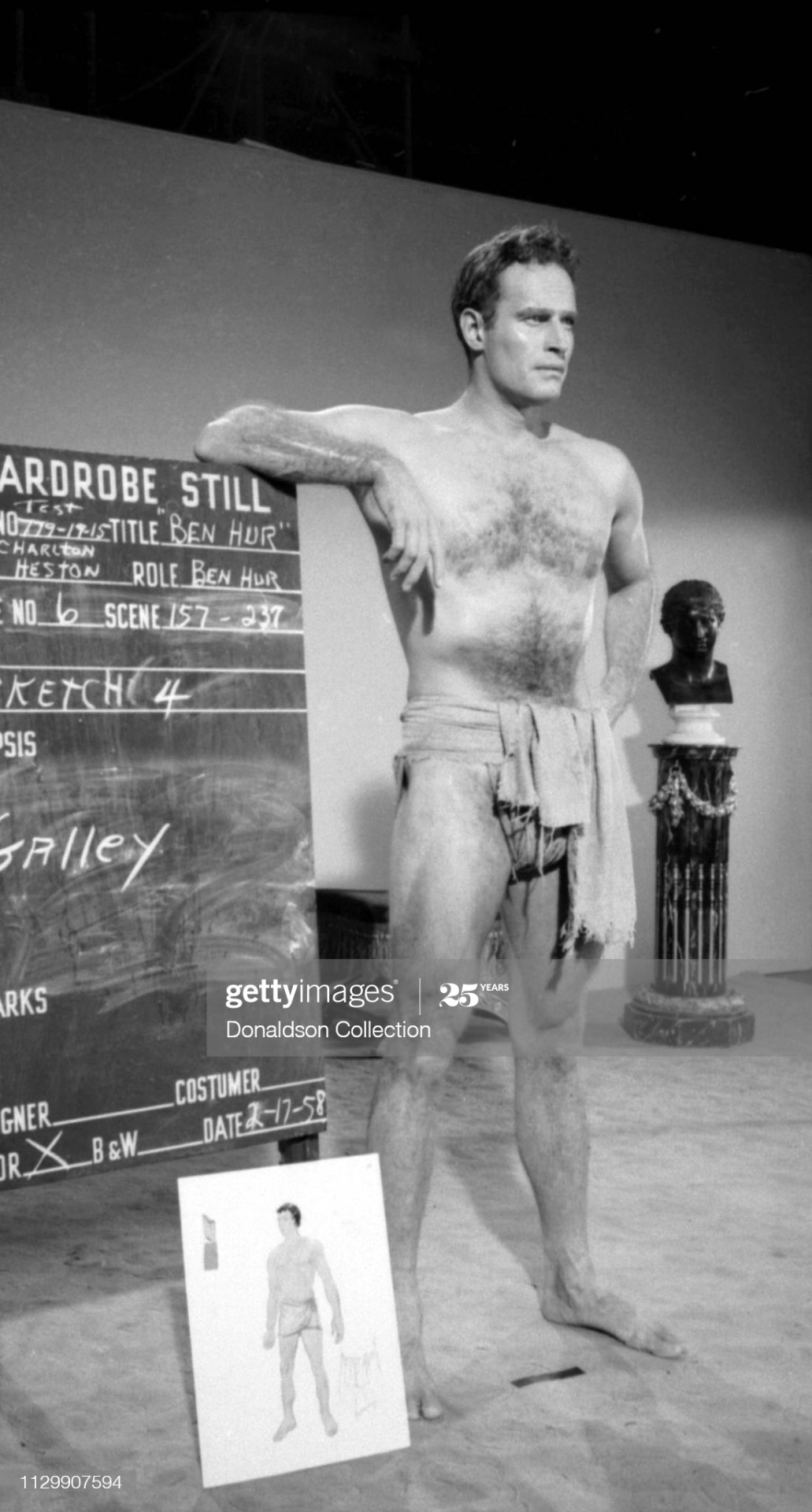

Movie Moments: Was Ben Hur gay?
Leo suggested a classic such as Ben-Hur, The Magnificent Seven or The Good, The Bad and The Ugly, for a Movie Moments, hence this selection.
One interesting item about Ben-Hur, released in 1959, is its underlying gay aspect.
The story:
Judah Ben-Hur (Charlton Heston) is a wealthy merchant of noble blood living in Jerusalem. His childhood friend Messala (Stephen Boyd), a tribune, arrives in Jerusalem to command the Roman garrison. At first happy to be reunited, they argue over Messala’s belief in the glory of Rome and imperial power, and Judah’s commitment to his faith and the Jewish people. They part in anger.
When a tile is accidentally dislodged from the roof of Judah’s house, almost killing the newly arrived governor, Messala sentences Judah to the galleys although he knows him to be innocent. Judah’s sister and mother are sent to prison. On the way to the galley, Judah is given water by a then unknown Jesus.
A galley slave for 3 years, Judah saves the life of Quintus Arrius, the Roman commander, during a battle. All charges are dropped against Judah and Arrius eventually adopts Judah as his son.
Judah returns to Jerusalem and confronts Messala, demanding that his mother and sister be freed. Unbeknownst to Judah, they have become lepers and have been sent to live in the Valley of the Lepers, away from everyone else. Esther, a servant girl in love with Judah, discovers the truth but tells Judah that they are dead.
When Judah is offered the chance to race a sheik’s chariot and 4 Arabian stallions in an upcoming race before Pilate, Judah accepts when he learns that Messala will be racing and is considered the finest charioteer in the land.
The chariot race:
The chariot race is one of the great film moments in history, filmed before the days of computer generated effects.
It can be viewed at: http://au.youtube.com/watch?v=pbQvpJsTvxU
Messala eliminates the other charioteers one by one but in the final confrontation with Judah, Messala’s chariot loses a wheel and he ends up being badly trampled.
On his deathbed, he refuses amputation which may save his life, stating that he will not meet Judah with half a body. When he is asked how he knows that Judah will come, he hisses that he will come. We then see Judah’s silhouette against the light in the doorway.
The following exchange takes place, one of the most emotionally powerful scenes in the movie:
Messala: Triumph complete, Judah. The race won. The enemy destroyed.
Ben-Hur: I see no enemy.
Messala: What do you think you see? The smashed body of a wretched animal! Is enough of a man still left here for you to hate? Let me help you...You think they're dead. Your mother and sister. Dead. And the race over. It isn't over, Judah. They're not dead.
Ben-Hur: Where are they? Where are they? (shouting) Where are they?
Messala: (vengefully) Look for them in the Valley of the Lepers, if you can recognise them. (Grabbing Judah's clothing) It goes on. It goes on, Judah. The race, the race is not over.
He dies gloating at Judah's horror,
More than friends?
Hollywood in 1959 was not a place to make statements about being gay, or to portray “the love that dare not speak its name”, as Oscar Wilde referred to homosexuality.
There has been conjecture and commentary for many years that the relationship between Judah and Messala was more than friendship.
This has been denied by the studio but conjecture persist.
In the 1995 documentary The Celluloid Closet, which examined how Hollywood treated gay, lesbian, bisexual and transgender characters, Gore Vidal recounted that he had been brought in to rewrite parts of the script, including the relationship between Judah and Messala. Director William Wyler was not satisfied that two men who had been close friends as youths could end up hating each other after disagreeing on politics. Vidal came up with the idea and subtext that the two had been lovers as teenagers and that Messala’s anger and hate come from Judah’s rejection of him. Wilder agreed provided that there was no direct reference to the sexuality and he discussed it with Stephen Boyd, who played Messala. He was told not to discuss it with Charlton Heston, who would freak out over the subtext.
Heston later denied both the gay subtext and that Vidal had had any input into the script, a comment rebutted by Vidal by referring to Heston’s 1978 autobiography in which he stated that Vidal had been the author of much of the final shooting script.
A bit of trivia:
At about the 5.37 mark on the above Youtube clip, you will see Judah get thrown forward out of the chariot and get back in. The stunt man being thrown out and forward, and getting back in, was unintended but looked good on film so it was kept in. A scene was shot with Heston getting back in to the chariot to link with the above footage.
How’s that Leo?
http://bytesdaily.blogspot.com/2010/01/movie-moments-was-ben-hur-gay.html
2 notes
·
View notes
Note
🎬 1995
THE CELLULOID CLOSET iconic retrospective on queerness & film and how we've always been there. literally made me want to go into film.
send me a 🎬 + a year and i’ll tell you my favorite movie from that year.
4 notes
·
View notes
Text
september diary
read:
thus were their faces by silvia ocampo
the lovely bones by alice sebold
the secret life of fungi by aliya whitely
the word for world is forest by ursula k le guin
watched:
rope (1948)
crimson peak (rewatch) (2013)
the guardians of the galaxy movie that came out over the summer idk what the subtitle is lol
casa susanna (2022)
the celluloid closet (1995)
amélie (rewatch) (2001)
all about eve (1950)
rebecca (rewatch) (1940)
the red shoes (1948)
favorites:
yogurt with honey, granola, and strawberries for breakfast (putting the strawberries in an airtight container makes them last longer in the fridge)
burrito bowls (easiest meal ever it turns out)
lindt dark chocolate with sea salt
apricots (jam and dried fruit, looking forward for them to be in season)
glossier ultralip in cranberry
painting my toenails red
washing sheets AND pajamas on friday so you get to sleep in the clean sheets and warm pajamas on a friday night :)
this one indica dominant blend pre roll
beautiful patterned dress i bought that has bugs in the pattern
still obsessed with my tattoo!!!!!
looking forward in october:
mom is visiting <3
finish crocheting sweater, make progress on blanket
make progress on the overstory
eat more canned soup they are taking up space on the shelf and you don’t need to ration them lol
drink lots of tea
1 note
·
View note